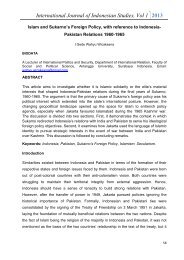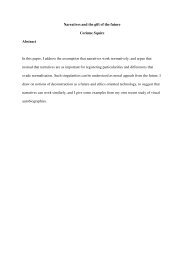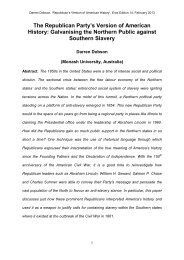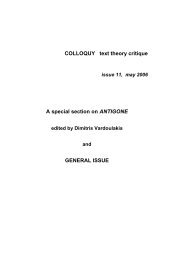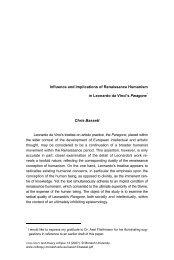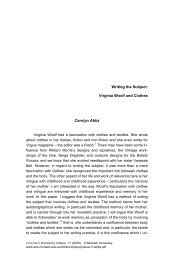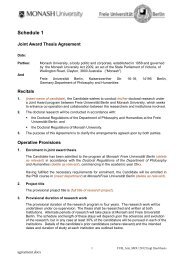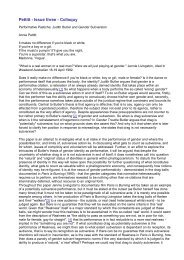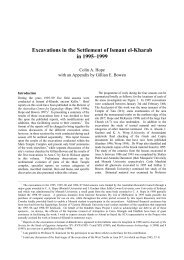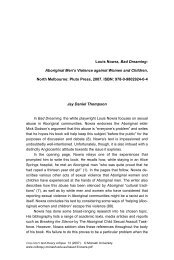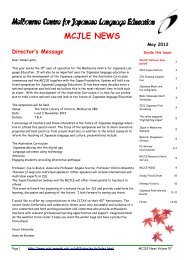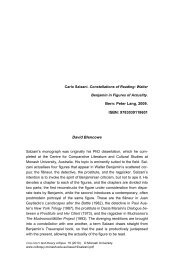The Acknowledgement of Love in Sarah Ruhl's Drama ... - Arts
The Acknowledgement of Love in Sarah Ruhl's Drama ... - Arts
The Acknowledgement of Love in Sarah Ruhl's Drama ... - Arts
You also want an ePaper? Increase the reach of your titles
YUMPU automatically turns print PDFs into web optimized ePapers that Google loves.
░ <strong>The</strong> <strong>Acknowledgement</strong> <strong>of</strong> <strong>Love</strong> <strong>in</strong> <strong>Sarah</strong> Ruhl’s <strong>Drama</strong> 9Charles’ speech to Lane about his love <strong>of</strong> Ana: “Ana has been <strong>in</strong> my geneticcode”), dirty love, an experience <strong>of</strong> f<strong>in</strong>itude, works at the limits <strong>of</strong> expressivity.For example, when Lane is treat<strong>in</strong>g Ana, they have a candid, unremarkableconversation that masks their love for each other:Ana: How did you and Charles fall <strong>in</strong> love?Lane: He didn’t tell you?Ana: No.Lane: Oh. Well, we were <strong>in</strong> medical school together. We wereanatomy partners. We fell <strong>in</strong> love over a dead body.<strong>The</strong>y look at each other.Lane forgives Ana.Ana: Want an apple?Lane: Sure. (CH, 93)<strong>The</strong> simple question—“Want an apple?”—illustrates that dirty love exists ata remove from rhetorical flourish and postur<strong>in</strong>g. Dirty love evades languageand dramatic representation because it exceeds the conceptual limits languagenecessarily imposes <strong>in</strong> order to communicate mean<strong>in</strong>g. 13 It <strong>of</strong>fers, asGadamer says <strong>of</strong> Erfahrung, <strong>in</strong>sight rather than knowledge; that is, it is experiencedbut resists conversion <strong>in</strong>to a knowable and expressible fact. 14 Inthis scene <strong>of</strong> <strong>The</strong> Clean House, Ruhl presents a trace <strong>of</strong> <strong>in</strong>expressible loveexperienced by Ana and Lane through a simple, ord<strong>in</strong>ary gesture, which isas far as representation can go when deal<strong>in</strong>g with an untidy experience <strong>of</strong>love.<strong>The</strong> Clean House presents two k<strong>in</strong>ds <strong>of</strong> love and shows the differentproblems <strong>of</strong> each. Clean love comes up short because it is difficult to articulateone’s feel<strong>in</strong>gs <strong>of</strong> love without resort<strong>in</strong>g to clichés that fail to adequatelyexpress one’s feel<strong>in</strong>gs. Dirty love, <strong>in</strong> contrast, resists expression <strong>in</strong>language, <strong>in</strong> part because it is characterised by experiences that entirelyrebuff categorisation. How could anyone possibly articulate the love Lanefeels as she forgives her husband’s lover? Such an experience <strong>of</strong> lovehappens <strong>in</strong> the course <strong>of</strong> ord<strong>in</strong>ary life. It is the territory that Stanley Cavell<strong>of</strong>ten exam<strong>in</strong>es <strong>in</strong> his vigorous defence <strong>of</strong> ord<strong>in</strong>ary experience, <strong>in</strong> contrastto conceptualised experience. At one po<strong>in</strong>t, he proposes a style <strong>of</strong> <strong>in</strong>terpretationcalled “the uneventful” that would attend to “the everyday, the common,the low, the near; you may call it an empirical <strong>in</strong>terpretation, still prephilosophical.”15 Once preserved from abstraction, such experience ist<strong>in</strong>ged by mortality. When Ana says she wants to have “a relationship with



